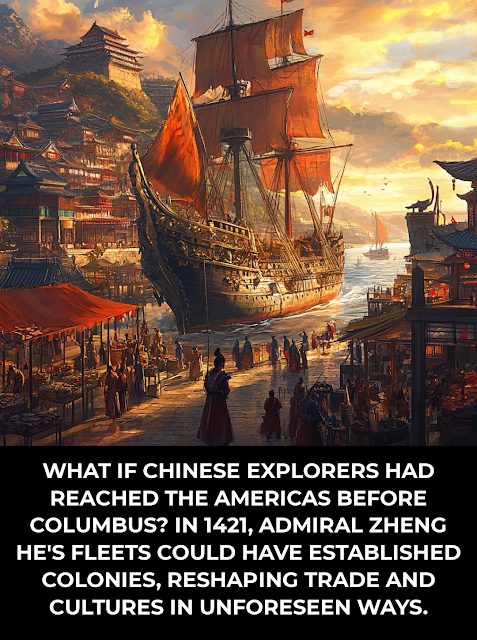Imagine if the ancient Egyptians had developed steam power!
Instead of relying solely on manpower and simple machines to build their iconic monuments, they could have harnessed the power of steam engines thousands of years before the industrial revolution. Pharaohs might have used steam-powered boats to travel up and down the Nile, transforming trade and transportation. Massive stone blocks for pyramids and temples could have been moved with ease using steam-driven cranes and pulleys.
This technological leap could have altered the course of history, potentially leading to an ancient industrial age in the heart of Egypt. Would the Great Library of Alexandria have become a hub for early engineering and scientific advancement?
Would the Mediterranean world have seen an unprecedented explosion of innovation?
What do you think the world would look like today if ancient Egyptians had tapped into the power of steam?
Observation: The steam part wasn't the real key point of the steam age. The steam age is just a pretty name for the coal age. I'm not sure that Egypt had good access to coal resources.
Imagine a world where Carthage defeated Rome in the Punic Wars. Instead of the Roman Empire shaping the Western world, the Carthaginian Empire would have dominated the Mediterranean. Latin might have been a minor dialect, while Punic became the lingua franca of Europe and North Africa. The famous Roman roads could have been Carthaginian trade routes, bustling with merchants from across the known world. Christianity might never have taken root, as Carthage was a stronghold of polytheistic beliefs. Instead of Roman architecture, we could see Carthaginian designs influencing our cities, with grand temples dedicated to Baal and Tanit.
How different would our history be if the victors of the Punic Wars were not the Romans?
What other cultural and technological advancements might have emerged under Carthaginian rule?
Observation: It isn't at all obvious that the Carthaginians had the same engineering, organizational, and conquest proclivities as the Romans.
Imagine a world where ancient Chinese explorers reached the Americas before Columbus. Around 1421, fleets of massive Chinese junks, led by Admiral Zheng He, could have set sail across the Pacific, landing on the West Coast of what is now the United States. What if these early Chinese settlers established thriving colonies along the Californian coast?
Cities like San Francisco and Los Angeles might have been founded centuries earlier, rich with Chinese architecture, culture, and technology. Trade routes could have emerged, connecting Asia directly with the Americas. The exchange of goods, ideas, and innovations would have reshaped both continents. Imagine Chinese influence on indigenous cultures and the blending of traditions that might have occurred. Would the European Age of Exploration have taken a different path?
The Spanish, Portuguese, and later British explorers might have encountered powerful Chinese settlements, altering their strategies and alliances in the New World. Consider the global power dynamics. With a strong Chinese presence in the Americas, the geopolitical landscape of the 16th and 17th centuries would look drastically different. The balance of power between East and West might have shifted in unexpected ways.
What other changes do you think could have happened if China had colonized the Americas?
Observation: The indigenous peoples of the Americas would probably still have suffered mass death killing 90%+ of them from Old World diseases.
Imagine a world where the Ottoman Empire embraced the Industrial Revolution in the 19th century. Factories would have sprung up in Istanbul, with steam engines transforming the landscape. The Bosporus Strait might have been lined with bustling ports, filled with ships transporting goods across Europe and Asia. With an industrial base, the Ottomans could have developed a powerful railway network, connecting distant provinces from the Balkans to the Arabian Peninsula. This might have led to quicker movement of troops and resources, potentially altering the outcomes of conflicts in the region. Urban centers like Cairo, Baghdad, and Damascus might have transformed into major industrial hubs, attracting workers and fostering innovations. The cultural and scientific advancements could have been significant, possibly influencing global technology and trade. Think about how different the Middle East and Europe could have been if the Ottomans had harnessed the power of industry.
What do you think would have been the biggest changes?
Observation: The early Islamic empire was a center of advanced medicine, science, and business technologies (like checking accounts). The Ottoman Empire had been in a state of deep decay and decline for many centuries before it actually fell in the early 1900s.




1 comment:
WRT the Ottomans; Islam as it has evolved over the centuries has not been a fertile ground for scientific progress. As evidenced by most Islamic counties today (excepting Iran to a significant extent). There was a period where there was significant freedom of thought, but with the collapse of the Abbasids (?) there was a swerve toward orthodoxy. If Islam had gone through a Reformation/Counter-Reformation type process then maybe? That however is a huge change which leads to a very different world.
Post a Comment